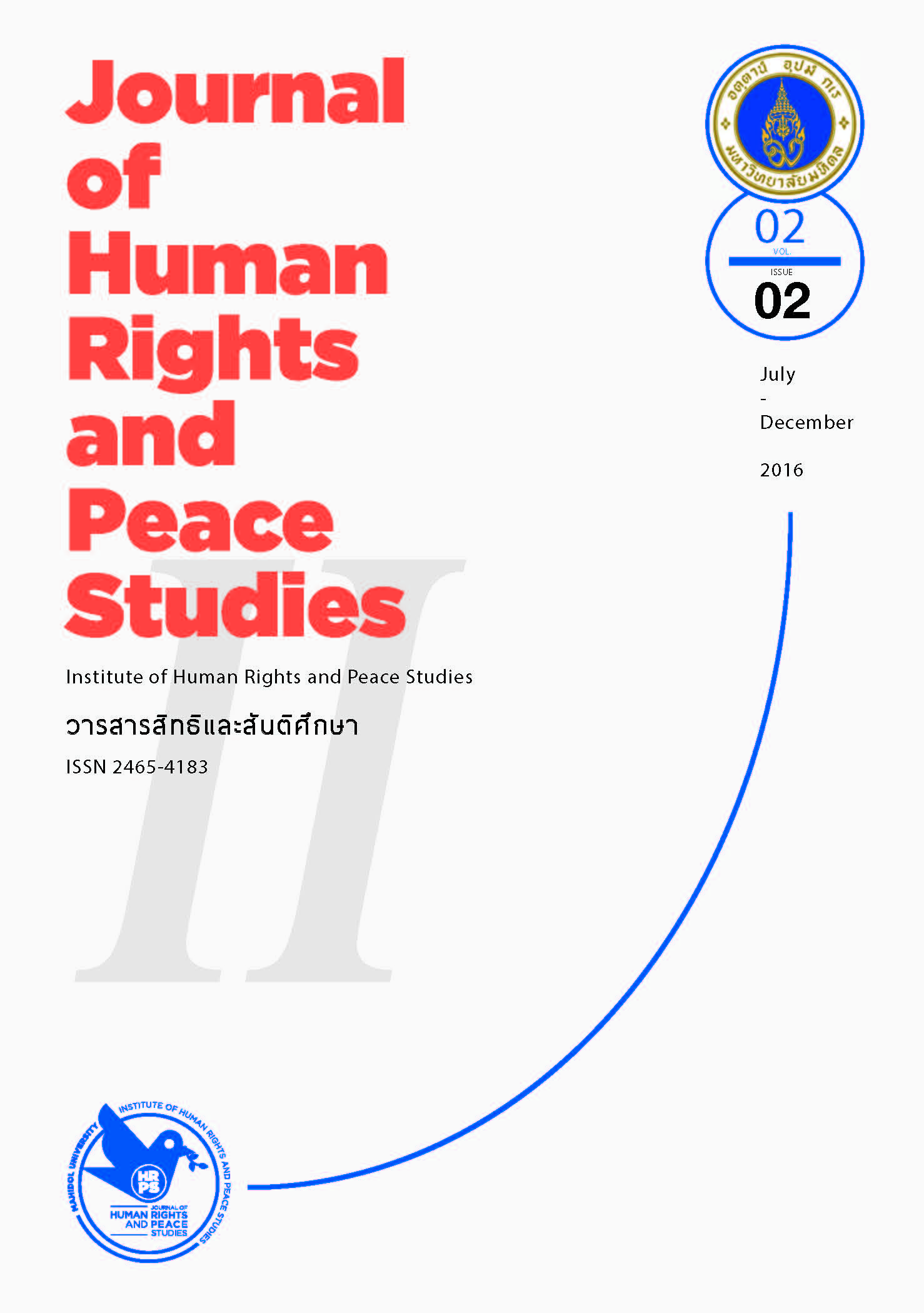Do Recommendations to the Universal Periodic Review work? Examining Recommendations in UPR’s first two cycles for Nepal, Sri Lanka and Indonesia
Main Article Content
Abstract
This paper looks at the Asia-Pacific region’s experience of the UPRprocess through case studies of three countries: Nepal, Sri Lanka, and Indonesia. It examines the effectiveness of the UPR process in communicating existing human rights concerns to the States by focussing on the recommendations given to States, and asks if this information is translated into tangible change in States’ responses to first cycle recommendations. Two thematic areas are selected: non-discrimination and freedom of speech. The selection of these are to capture both fundamental human rights though nondiscrimination, and also to see if the mechanisms allow for individual interpretations in the freedom of expression, which is widely debated in all countries. The study shows that recommendations,which should emerge from a participatory process involving non-governmental organisations (NGOs), too often reflect only State interests, and thus the UPR Working Groups and participating states in many cases do not adopt civil society recommendations when framing their own recommendations. Finally, this study assesses the extent to which the UPR process has translated into real changes in policy and practices in the region.
Article Details
The views, opinions, and pictures expressed in this journal are those of the authors and do not necessarily reflect the opinions and viewpoints of the editor and the editorial board. All rights are reserved by the authors and the Institute of Human Rights and Peace Studies of Mahidol University. No part of this journal may be reproduced, stored in a retrieval system, or transmitted in any form or by any means without the prior permission in writing from the journal’s editor, or as expressly permitted by law, or under terms agreed with the appropriate reprographics rights organization. Non-commercial use of information in this journal must be properly referenced.
References
Universal Periodic Review Second session of the UPR.”
Amnesty International. (2012). “Indonesia. Stalled Reforms:
Impunity, Discrimination and Security Force Violations
in Indonesia: Amnesty International Submission to the
UN Universal Periodic Review”
Arus Pelangi et al. (2012). “Submission of Shadow Report on the
Situation of Human Rights Defenders in Indonesia for
the 13th Session of the UN Universal Periodic Review for
Indonesia by the Civil Society Coalition for the Protection
of Human Rights Defenders.”
Center for Human Rights and Democracy. (2012). Submission to the
Universal Periodic Review, 13th Session of the UPR
Working Group of the Human Rights Council. Brawijaya
University, Faculty of Law: May.
DailyFT. “Appeals Court issues notice on respondents in Jaffna land
acquisition cases.” 31 May 2013.
FIDH. “Burma: Government’s response to UN review ‘extremely
Disappointing’.” Joint Press Release with Alt-ASEAN. 17
March 2016.
INSEC. (2011). “Summary of the reports of Coalition of Nepalese
NGOs for the UPR, Coalition for Women’s Rights, and
Coalition of Durban Review Conference Follow-up Com
mittees.” Kathmandu: INSEC.
Internal Displacement Monitoring Centre. (2007). Civilians in the way
of conflict: Displaced people in Sri Lanka. NGO Report.
Colombo: IDMC.
Minority Rights Group International. (2008). One year on: counter-
terrorism sparks human rights crisis for Sri Lanka’s
minorities. NGO Report. MRGI.
Nepal Government. (2013). Mid-term implementation assessment of
the UPR recommendations. Kathamdu: Nepal Government
Printers
National Human Rights Commission of Nepal. (2012). Implementation
Status of NHRC and UPR Recommendations on Child
Rights. Kathmandu: NHRCN, December.
National Human Rights Commission of Nepal. (2013). Mid-Term
Report on the Implementation status of Conclusion and
Recommendations of Universal Periodic Review of Nepal.
Kathmandu: NHRCN, September.
Networking for Rights in Sri Lanka, et al. (2012). “Freedom of
Expression Rights in Sri Lanka. NGO Submission to
Second Cycle on Sri Lanka Universal Periodic Review.”
Colombo: Free Media Movement, Sri Lanka INFORM
Human Rights Documentation Center, 23 April.
OHCHR. (2008). “Summary of 17 stakeholders’ submissions to the
Indonesian Universal Periodic Review,” A/HRC/WG.6/1/
IDN/3.9 April.
OHCHR. (2012). “Summary of 32 stakeholders’ submissions to the
Universal Periodic Review” A/HRC/WG.6/13/IDN/3
23 May.
OHCHR. (2012b). “Summary of Other Stakeholders’ submissions to the
the UN Universal Periodic Review (Sri Lanka)” A/HRC/
WG.6/14/LKA/3. 1 November
Sri Lanka. (2008). “National Report submitted in accordance with
Paragraph 15 (A) of the Annex to Human Rights Council
Resolution 5/1.” A/HRC/WG.6/2/LKA/1. 2 May
Sri Lanka. (2008). “National Report submitted in accordance with
Paragraph 5 of the annex to Human Rights Council resolution
16/21.” A/HRC/WG.6/14/LKA/1. 10 August
Sri Lanka Democracy Forum. (2008). “Submission to the Universal
Periodic Review of Sri Lanka.”
Sri Lanka Government. (2011). The National Action Plan for the
Protection and Promotion of Human Rights – 2011-2016.
Colombo: Government of Sri Lanka.
Sri Lanka Government. (2013). Gazette Extraordinary No. 1807/23:
26 April.
Sumanthiran, M.A. (2013). “Replaying History: Land Grabs in the
North and East” Global Peace Support Group, 18 November.
Available at: https://www.globalpeacesupport.com.
Working Group on Nepal Universal Periodic Review. (2011).
“Report of the Working Group on the Universal Periodic
Review: Nepal.” A/HRC/17/5. 8 March
Working Group on Sri Lanka Universal Periodic Review. (2008).
“Report of the Working Group on the Universal Periodic
Review: Sri Lanka.” A/HRC/8/46: 5 June.
Working Group on Sri Lanka Universal Periodic Review. (2008).
“Report of the Working Group on the Universal Periodic
Review: Sri Lanka.” A/HRC/22/16: 18 December.
UPR-Info. (2013). “Nepal: Mid-term Implementation Assessment.”.
Geneva: UPR-Info, November


